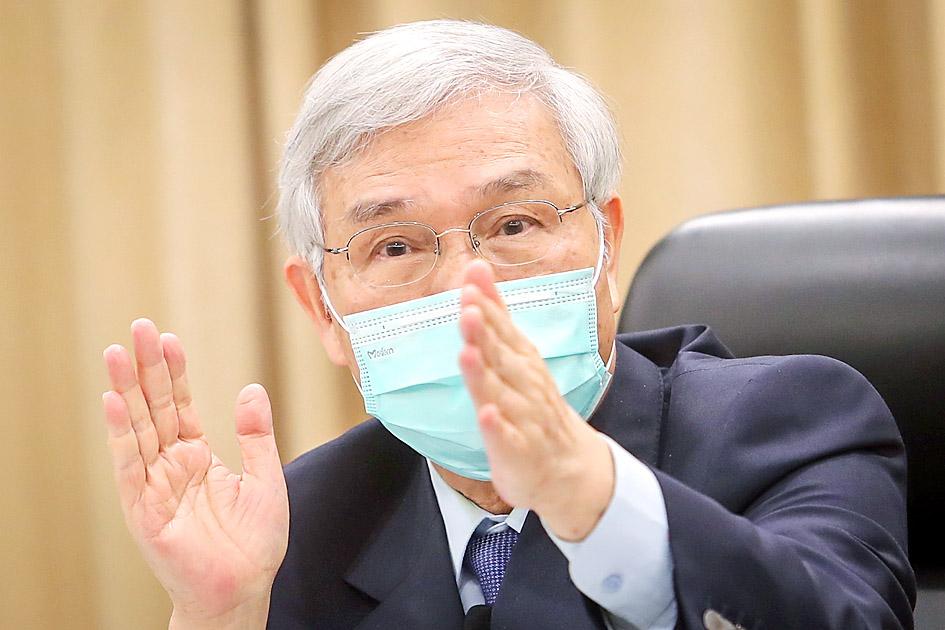The central bank yesterday kept its policy rates in place, while raising its forecast for GDP growth this year from 4.53 percent to 5.08 percent, saying that this month’s COVID-19 outbreak has had little negative effect on exports and private investment, although uncertainty lingers.
Despite a vibrant economy, the central bank said it was not worried about inflation, nor was it inclined to further tighten credit, as the level-3 COVID-19 alert and coming property tax hikes have already helped cool the real-estate market.
Central bank Governor Yang Chin-long (楊金龍) said he agreed with the US Federal Reserve that current inflationary pressures are temporary and would start to subdue next quarter when the low base effect tapers off.

Photo: CNA
Excluding spikes in oil prices and airfares, consumer prices remain stable, giving the central bank room to hold policy rates unchanged, Yang told an online news conference.
It is the first time that the central bank has moved the quarterly media briefing online after its board members met in three separate rooms to avoid infection risks.
The central bank is looking at an annual increase of 1.58 percent in consumer prices this year with the core consumer price index, a more reliable long-term price tracker because it expels volatile items, clocking a 1.1 percent gain.
Although consumer activity has come to an abrupt halt, exports and private investment continue to pick up as the US and Europe reopen their economies, favorable for global trade, Yang said.
Exports this quarter are likely to rise by more than 30 percent from a year earlier, riding on strong inventory demand worldwide for tech and non-tech products, Ministry of Finance data showed.
The governor reiterated that he was uncomfortable about increasing interest rates soon, as even talking about it could attract hot money, while peers around the world maintain quantitative easing to support their economies.
The New Taiwan dollar has climbed to a near three-decade high against the US dollar this year on the back of robust exports and relatively generous dividend payouts by local listed firms, Yang said.
Yang said he understood that tight movement restrictions were responsible for sluggish property transactions, and the market could regain traction once the level 3 alert is lifted.
“The central bank will keep a close watch, and take quick action to rein in property price hikes whenever necessary,” he said, as the effect of selective credit controls is not yet evident.
However, the governor said he has been pleased with ultra-low instances of bad loans linked to mortgage and construction financing.

The Central Election Commission has amended election and recall regulations to require elected office candidates to provide proof that they have no Chinese citizenship, a Cabinet report said. The commission on Oct. 29 last year revised the Measures for the Permission of Family-based Residence, Long-term Residence and Settlement of People from the Mainland Area in the Taiwan Area (大陸地區人民在台灣地區依親居留長期居留或定居許可辦法), the Executive Yuan said in a report it submitted to the legislature for review. The revision requires Chinese citizens applying for permanent residency to submit notarial documents showing that they have lost their Chinese household record and have renounced — or have never

A magnitude 5.6 earthquake struck off the coast of Yilan County at 12:37pm today, with clear shaking felt across much of northern Taiwan. There were no immediate reports of damage. The epicenter of the quake was 16.9km east-southeast of Yilan County Hall offshore at a depth of 66.8km, Central Weather Administration (CWA) data showed. The maximum intensity registered at a 4 in Yilan County’s Nanao Township (南澳) on Taiwan’s seven-tier scale. Other parts of Yilan, as well as certain areas of Hualien County, Taipei, New Taipei City, Taoyuan, Hsinchu County, Taichung and Miaoli County, recorded intensities of 3. Residents of Yilan County and Taipei received

Taiwan has secured another breakthrough in fruit exports, with jujubes, dragon fruit and lychees approved for shipment to the EU, the Ministry of Agriculture said yesterday. The Animal and Plant Health Inspection Agency on Thursday received formal notification of the approval from the EU, the ministry said, adding that the decision was expected to expand Taiwanese fruit producers’ access to high-end European markets. Taiwan exported 126 tonnes of lychees last year, valued at US$1.48 million, with Japan accounting for 102 tonnes. Other export destinations included New Zealand, Hong Kong, the US and Australia, ministry data showed. Jujube exports totaled 103 tonnes, valued at

BIG SPENDERS: Foreign investors bought the most Taiwan equities since 2005, signaling confidence that an AI boom would continue to benefit chipmakers Taiwan Semiconductor Manufacturing Co’s (TSMC, 台積電) market capitalization swelled to US$2 trillion for the first time following a 4.25 percent rally in its American depositary receipts (ADR) overnight, putting the world’s biggest contract chipmaker sixth on the list of the world’s biggest companies by market capitalization, just behind Amazon.com Inc. The site CompaniesMarketcap.com ranked TSMC ahead of Saudi Aramco and Meta Platforms Inc. The Taiwanese company’s ADRs on Tuesday surged to US$385.75 on the New York Stock Exchange, as strong demand for artificial intelligence (AI) applications led to chip supply constraints and boost revenue growth to record-breaking levels. Each TSMC ADR represents